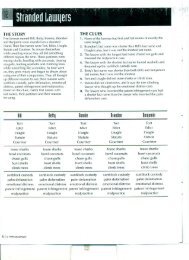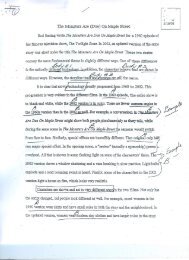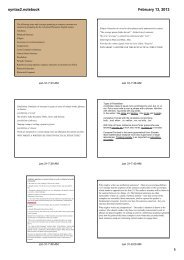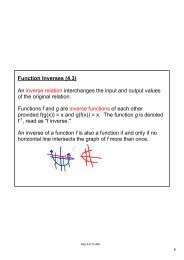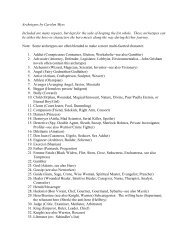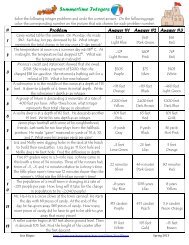Rosencrantz and Guildenstern Are Dead - Cherokee County Schools
Rosencrantz and Guildenstern Are Dead - Cherokee County Schools
Rosencrantz and Guildenstern Are Dead - Cherokee County Schools
Create successful ePaper yourself
Turn your PDF publications into a flip-book with our unique Google optimized e-Paper software.
Hamlet mistakes him for the King. Polonius is portrayed in both plays as old, garrulous, <strong>and</strong> occasionally<br />
foolish.<br />
Soldier<br />
In both plays a soldier talks with Hamlet <strong>and</strong> identifies the Norwegian military comm<strong>and</strong>er, Fortinbras, as he<br />
marches his troops across Denmark toward Pol<strong>and</strong>. Hamlet admires Fortinbras for his bravery <strong>and</strong> Fortinbras<br />
succeeds to the throne in Denmark after both Claudius <strong>and</strong> Hamlet die.<br />
Tragedians<br />
The tragedians who perform The Murder of Gonzago in Hamlet are more child-like <strong>and</strong> playful in Stoppard's<br />
comedy, where they play musical instruments as well as miming their roles in The Murder of Gonzago.<br />
Essays <strong>and</strong> Criticism<br />
Stoppard's Themes of Uncertainty <strong>and</strong> Confusion<br />
The twentieth century could easily be summed up as an Age of Uncertainty. When it began, nearly one<br />
hundred years ago, religious certitude was already eroding, <strong>and</strong> the process has continued steadily as we<br />
approach the twenty-first century, leaving many more human beings unsure about the existence of an<br />
all-powerful, all-knowing, <strong>and</strong> all-loving divine being who guarantees the order <strong>and</strong> rationality of the<br />
universe. Two unprecedented world wars <strong>and</strong> the unleashing of atomic weapons have even made us uncertain<br />
about the continued existence of the planet. And the highly influential Freud has subtly contributed to our<br />
uncertainty with his essential message that much of what motivates us remains below the surface of our<br />
normal awareness. Perhaps most paradoxically, science, the paragon of certainty, has dominated the twentieth<br />
century, but as its discoveries advance our knowledge on both telescopic <strong>and</strong> microscopic scales science also<br />
reveals how much more we don't know <strong>and</strong> thus adds to our collective sense of uncertainty. From large issues<br />
to small, from public policy to personal lives, from those who are highly educated to those who are not, a<br />
feeling of uncertainty has come to typify our age.<br />
This sensitivity to uncertainty may very well account in part for the enormous <strong>and</strong> continued appeal of<br />
<strong>Rosencrantz</strong> <strong>and</strong> <strong>Guildenstern</strong> <strong>Are</strong> <strong>Dead</strong> because Stoppard's play focuses quite comically <strong>and</strong> movingly on<br />
this very issue. It is ultimately a play about ordinary people overwhelmed by confusion <strong>and</strong> uncertainty. In<br />
fact, in an interview with Giles Gordon in 1968, Stoppard explains that the genesis of the play came from his<br />
interest in the way <strong>Rosencrantz</strong> <strong>and</strong> <strong>Guildenstern</strong> "end up dead without really, as far as any textual evidence<br />
goes, knowing why. Hamlet's assumption that they were privy to Claudius's plot is entirely gratuitous. As far<br />
as their involvement in Shakespeare's text is concerned they are told very little about what is going on <strong>and</strong><br />
much of what they are told isn't true. So I see them much more clearly as a couple of bewildered innocents<br />
rather than a couple of henchmen, which is the usual way they are depicted in productions of Hamlet."<br />
This tale of "bewildered innocents" begins on the day they have been summoned by a king's messenger to<br />
appear at the Danish court. The messenger gave them no explanations or directions, simply orders, <strong>and</strong> their<br />
first encounter with King Claudius leaves them not much more enlightened. Speakers of colloquial prose in<br />
Stoppard's story, <strong>Rosencrantz</strong> <strong>and</strong> <strong>Guildenstern</strong> are bombarded with Claudius's Elizabethan rhetoric <strong>and</strong><br />
Stoppard's humor in this opening confrontation with the Hamlet world includes the ordinary person's<br />
admission that much of this Shakespearean language can seem incomprehensible. That it seems so to<br />
<strong>Rosencrantz</strong> <strong>and</strong> <strong>Guildenstern</strong> is obvious. As soon as the Hamlet characters have left, <strong>Rosencrantz</strong> wails, "I<br />
want to go home" <strong>and</strong> <strong>Guildenstern</strong> attempts to calm him by saying, "Don't let them confuse you," even<br />
though he is as confused <strong>and</strong> uncertain as his friend. After stuttering his reassurances to <strong>Rosencrantz</strong>,<br />
<strong>Guildenstern</strong> asks, "Has it ever happened to you that all of a sudden <strong>and</strong> for no reason at all you haven't the<br />
faintest idea how to spell the word— 'wife'—or 'house'—because when you write it down you just can't<br />
Other Characters 12





